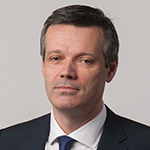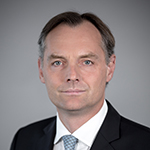UBP’s results for the first half of 2019 included a figure that, although symbolic, went almost unnoticed. No-one paid it much attention, but it must have been a source of great satisfaction for Guy de Picciotto, the bank’s Chief Executive Officer. At 30 June 2019, UBP’s assets under management (AuM) totalled CHF 134 billion, which was significant because it was practically the same as the record level achieved in late 2007 (CHF 136 billion). However, that was before UBP was shaken by the financial crisis and the Madoff scandal, leading to a period of “blood, sweat and tears”, although it turned out to be less disastrous than it seemed at the time.
On the face of it, of course, the bank’s financial statements gave some cause for concern. By the end of 2010, assets under management had dropped to CHF 65 billion, a serious decline that was not solely down to the fraud perpetrated by Bernard Lawrence Madoff, who was arrested on 12 December 2008 and subsequently sentenced to 150 years in prison. Speaking about UBP’s Madoff exposure a few years later, Guy de Picciotto said “we were always cautious and kept it on the low side – 2% of the portfolio – but because of the enormity of the Madoff scandal, even that was too much”.
In fact, the main factor that affected UBP was the hedge fund industry’s plunge, partly caused by market deregulation resulting from central-bank intervention. Previously, UBP had embraced alternative investments to the point where they made up a huge proportion of its portfolios.
To get AuM back up to CHF 134 billion, therefore, UBP has had to double in size in the space of eight years. That is no small achievement. In Spain, football fans refer to a major comeback – like the one achieved by Barcelona against Paris Saint-Germain in their round-of-16 Champions League tie in 2017 – as a “remontada”. After being beaten 4–0 in Paris, Barcelona won the return leg at Camp Nou 6–1. UBP’s comeback is on a par with that stunning result. It is the result of the de Picciotto family’s refusal to give up. At no point did they ever consider pulling back, whereas others with less fighting spirit might have preferred to call it a day and sell out to the highest bidder. At UBP’s head office on Geneva’s Rue du Rhône, there was never any feeling of being on the Titanic and needing to man the lifeboats. “Edgar and Guy de Picciotto never panicked for a second,” remembers Jérôme Koechlin. At the time, Jérôme was UBP’s Company Secretary and Head of Communications, and he played a hands-on role in managing the crisis alongside Edgar and Guy. Since then, he has moved to the Reyl group, where he is the Secretary of the Executive Committee and Head of Communications. “They showed remarkably cool heads and were not content with just plugging the gaps. They immediately wanted to rebuild and ensure that the bank’s new foundations would be strong enough to avoid those kinds of episodes in the future. In the midst of a crisis, their first reaction was to see the opportunities.” With the end of banking secrecy regarding tax matters, the witch-hunt by the US Department of Justice and widespread pessimism in the markets, it is fair to say that Union Bancaire Privée was not the only bank to suffer. However, for the de Picciotto family, it was a propitious time for new ideas, new methods and new horizons.
And new faces too. To get things moving in the right direction, like a tennis player hitting back a killer return, the family surrounded itself with seasoned professionals capable of implementing a highly ambitious plan to relaunch the bank. The plan involved nothing less than reinventing the asset management business, revamping the private banking division, expanding internationally, restructuring the group and buying up rivals at a good price where the opportunity arose. And UBP had to move as quickly as possible. To lead that manoeuvre, Edgar and Guy de Picciotto appointed three seconds-in-command, or XOs as they are called in the Royal Navy. The names of Ian Cramb in operations, Michel Longhini in private banking and Nicolas Faller in asset management were added to UBP’s roll-call of talent.
Ian Cramb, now Chief Operating Officer, arrived from Citigroup in 2009, just over 10 years ago. He brought with him a “Get Global” strategy and new organisational structures.
“When I started at UBP, the hardest thing was not managing the fall-out from the financial crisis but reorganising the whole operation – IT systems, HR, logistics and the back office – so that we could apply the new strategy.”
“At management level, huge numbers of processes had to be put in place. The first 12–18 months were particularly hard work.” While that structure was being built, UBP’s new-look business lines took shape. Nicolas Faller joined in 2010 from Fortis, taking charge of asset management with the aim of broadening the product range.
“There was a very strong desire to freshen up the offering and we had a lot of freedom in the way we managed projects, which was an approach I liked very much,”
he explains. “I had a great deal of leeway when recruiting my teams and selecting the markets we should prioritise. To take just one example, UBP had no presence in Japan before the crisis. Today, we have CHF 7 billion of AuM there, purely through organic growth. We have been able to put together the right teams and develop the right products.”
When Nicolas Faller arrived at UBP, most of the product range was focused on alternative investments. Today, of the CHF 43 billion under management in the asset management business, hedge funds only account for CHF 7–8 billion. “My role was to reposition our alternative investments, not abandon them, and develop long-only asset management, an area in which we previously had only a very small presence. We did it by building the necessary skills and forming partnerships with the best asset managers, who were attracted to our distribution capabilities.” Having previously been regarded as one of the world’s leading specialists in alternative investments, UBP has now forged an equally strong reputation in other areas such as listed fixed income, including the credit, high yield, emerging debt and convertible segments.
Alongside all of that, the private banking division has also been busy. While the asset management business embarked on a journey to quadruple its size in less than 10 years, private banking started to ramp up operations with an aggressive acquisition strategy. It started in 2011 with the purchase of ABN Amro’s Swiss division, continued with the acquisition of Lloyds Banking Group’s international operations and ended with the integration of Coutts International, the wealth management franchise that Royal Bank of Scotland chose to divest in 2016. Of all those deals, the Coutts takeover possibly carries the most prestige, but above all the most strategic appeal. Coutts, which had CHF14 billion of assets under management and 250 employees in Hong Kong and Singapore, has been a major gateway into Asia for UBP, which previously only had around 20 people in Singapore. Today, UBP’s AuM in the Asian market, across both its asset management and private banking businesses, is over CHF 25 billion.
“With the end of banking secrecy regarding tax matters, it had long been clear to Edgar and Guy that they had to focus more on international markets than on Switzerland if they wanted to boost UBP’s growth,” emphasises Ian Cramb. ”When I arrived in 2009, more than 80% of our staff members were in Switzerland. Now, that figure is barely two thirds, because our main growth drivers are elsewhere.”
Overall, UBP’s 2020 model is nothing like the 2010 model. Its chassis and engine capacity have been upgraded, and it has a more upmarket position and is a long way from realising its full potential. Although CHF 134 billion is an impressive number in terms of progress achieved, there is a second figure that is just as impressive: the cost/income ratio, which is around 65%, showing UBP’s careful approach to growth. It is unlikely to be blown off course for a long time to come. It will continue to focus mainly on the international market – with particular attention on Europe – and on growing its asset management business, with major efforts in the private assets segment. It might be reasonable for UBP to think that the toughest times are now behind it, but that is not really how people see things within the bank. “As soon as you say that,” says Ian Cramb with a mischievous smile, “you risk falling asleep”.

Ian Cramb
Chief Operating Officer

Nicolas Faller
Co-CEO Asset Management

